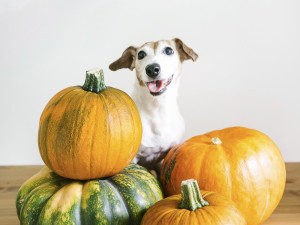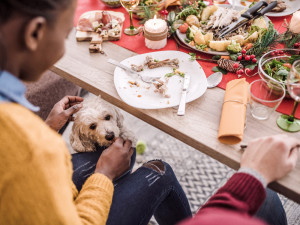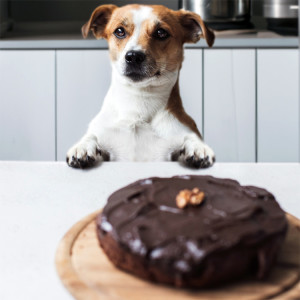Can Dogs Eat Cinnamon Rolls?
They smell yummy... but maybe they aren’t so great for the diet.

Share Article
In This Article:
Are Cinnamon Rolls Safe for Dogs? Cinnamon Roll Ingredients That Are Harmful to Dogs What to Look For If Your Dog Eats a Cinnamon Roll When to Contact a Vet for Cinnamon Roll Consumption Alternatives to Cinnamon Rolls for Dogs Frequently Asked Questions
Few things pair better with a warm cup of coffee or tea than a nice, gooey cinnamon roll. Just the thought of one can have our mouths watering, and the smell of one will definitely induce a drool cascade from your dog’s mouth. So, are cinnamon rolls free to share with your dog? Sorry pup, this delicious treat is on the do not share list, and there are many reasons why.
Are cinnamon rolls safe for dogs?
Unlike their feline counterparts, some dogs can develop a real sweet tooth, something they may con you into satisfying from time to time. While a small bit of natural sugars every now and them isn’t a big deal, eating something like a cinnamon roll can be.

Depending on the recipe, cinnamon rolls may contain ingredients that are immediately toxic to a dog, as well as some ingredients that can lead to lasting issues. Even cinnamon rolls made from “healthier” ingredients shouldn’t end up in your dog’s mouth. There are many safer and healthier treat options out there. If your pup ends up eating a cinnamon roll despite your best efforts, monitor them for signs of illness and contact your veterinarian.
Cinnamon roll ingredients that are harmful to dogs
Let’s start with the basics: Cinnamon rolls are made with a bread dough foundation. This often contains butter, sugar, flour, yeast, and possibly milk. They are then filled with more sugar, butter, and a good dose of cinnamon. In small, infrequent amounts these ingredients typically don’t spell badness, but if your pup were to eat all cinnamon rolls all the time, the extra calories would quickly pack on unwanted weight that could increase their risk for things like joint disease and diabetes.
Raw cinnamon rolls get a special mention here because when dogs eat bread dough there is the potential for bloat caused by the rising dough and alcohol intoxication from the yeast’s fermentation of sugars. Both are serious conditions that require immediate veterinary attention.
Now for the individualism that’s another draw of cinnamon rolls. Some may contain little additions such as raisins, nutmeg, chocolate, or the artificial sweetener xylitol. Each of these have the potential to cause serious issues in your dog, even in small amounts. So, if your pup helps themselves to cinnamon rolls with these ingredients, contact your veterinarian immediately. The cinnamon itself can be toxic in larger doses, so if your pup gets to the cinnamon powder while you’re preparing cinnamon rolls, speak to your vet.
Another sought-after addition to cinnamon rolls is the frosting. Let’s just say this is like adding fuel to the fire or sugar to more sugar. All these sweetness can land your dog with a bad case of digestive upset, bringing on things like vomiting, diarrhea, and stomach pain.
What to look for if your dog eats a cinnamon roll
With any luck, your dog’s cinnamon roll encounter will be a small bite of one that doesn’t contain those trigger ingredients of raisins, nutmeg, chocolate, or xylitol. So all you might see is a bit of stomach upset that goes away on its own within a day or two. But if your dog nabs more than a bite, that digestive upset may be more severe or last a few days longer.
If said cinnamon roll contained harmful ingredients, you may see varying degrees of stomach upset and lethargy, potentially followed by increased thirst and urination, muscles tremors, seizures, or even death.
When to contact a vet for cinnamon roll consumption
If your dog eats a cinnamon roll containing xylitol, chocolate, nutmeg, or raisins, don’t wait for any negative signs. Contact your veterinarian immediately. Also contact your vet if your dog eats raw cinnamon roll dough or if they help themselves to more than a couple of bites of any cinnamon roll version.
Immediate veterinary care may involve inducing vomiting at the clinic, so you’ll want to see your vet as soon as possible for the best results. If your pup only grabs a small bite or two, your vet may advise you to monitor them for signs of illness at home. A little upset stomach may be expected, but you’ll want to see the vet if your pup has severe vomiting, diarrhea, stomach pain, or any other signs that last for longer than a day or two.
Alternatives to cinnamon rolls for dogs
Fortunately, dogs don’t need cinnamon rolls to survive, so you can choose a safe and healthy option to satisfy their cravings for sugar. Small servings of apple, banana, berries, watermelon, and pears are good options. Just remove the seeds and cut into bite-sized chunks.
For a savory option, lean cooked meats, such as chicken, pork, beef and fish, work great. Cooked eggs and even vegetables like carrots, sweet potato, green beans, peas, and broccoli are other options. Just be sure to keep them seasoning free and cook without oil or butter.
Bottom line
Cinnamon rolls aren’t a healthy option for dogs, and some may contain harmful ingredients such as nutmeg, raisins, chocolate, or xylitol.
If your dog eats more than a bite or two of cinnamon roll, raw bread dough, or any of the ingredients listed above, contact your vet immediately.
FAQs
Is cinnamon bad for dogs?
Small amounts of cinnamon typically aren’t harmful to dogs and can even offer some helpful benefits such as providing antioxidants, reducing inflammation, or settling an upset stomach. However, larger amounts of cinnamon can be irritating to the digestive tract, mess with a dog’s blood sugar, and even affect the heart and liver.
Let’s make a special note for cinnamon essential oil here. Dogs shouldn’t eat or come in contact with any amount of this as the higher concentrations can be even more harmful.
How much cinnamon can dogs eat?
For small dogs, amounts of 1/8 to 1/4 teaspoon of cinnamon can be harmful, while larger dogs may be able to eat up to one teaspoon. These higher amounts aren’t likely to be found in most baked goods, instead dangerous consumption levels usually occur when a dog gets into the bottle or jar of cinnamon and eats the powder directly.
Can dogs eat Pillsbury dough?
Raw bread dough that contains yeast can cause significant issues in dogs, mainly bloat and alcohol intoxication as the yeast goes to work. If your pup eats raw yeast dough, see your veterinarian immediately. Baked bread usually isn’t immediately harmful, but eating a lot of it repeatedly can lead to weight gain.
References
Arnold, Victoria Lynn. “Can Dogs Have Cinnamon.” PetMD. 28 Sept 2023. https://www.petmd.com/dog/nutrition/can-dogs-have-cinnamonopens in new tab.
Riley, Elizabeth. “Yeast Dough Dangers in Pets.” Veterinary Partner. 27 May 2021. https://veterinarypartner.vin.com/default.aspx?pid=19239&catId=102923&id=10273298opens in new tab.

Dr. Chyrle Bonk, DVM
Dr. Chyrle Bonk has been a mixed-animal veterinarian since 2010, with a special interest in rehabilitation. When she's not practicing or writing about veterinary medicine, you may find her exploring the outdoors with her family or tending to her cows, horses, chickens, or cats and dogs.
Related articles
Can Dogs Eat Pumpkin?
This superfood is delicious and full of nutrients—but how much is too much of a good thing?
![dog hiding under christmas dinner table eating scraps]()
Which Christmas Foods Can My Dog Eat?
From turkey to stuffing, find out which festive foods it’s safe to sneak your pup from the table.
Can Dogs Eat Pretzels?
A salty treat, anyone?
Can Dogs Eat Garlic Bread?
It’s the king of sides, but definitely not for your dog. Read why.
Can Dogs Eat Chocolate?
No isn’t a strong enough answer here. Learn why.
Can Dogs Eat Ritz Crackers?
They’re great for the cheese plate, and your pup wants to try some.








